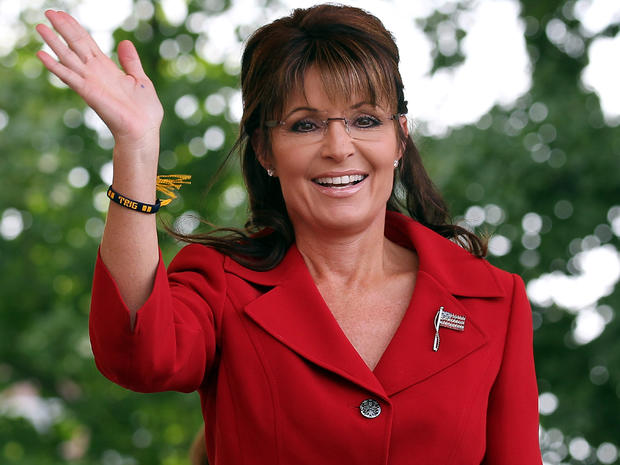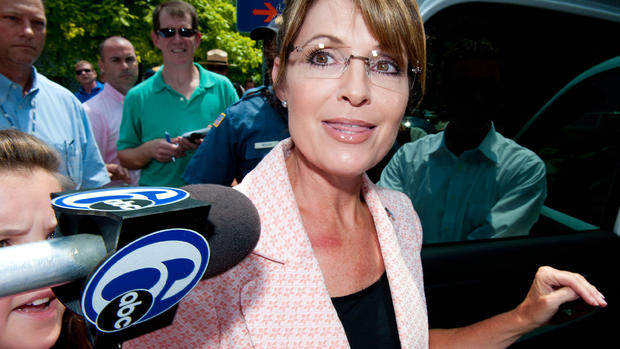Sarah Palin's decision not to run isn't shocking
Sarah Palin is not running for president.
Putting to rest more than three years of speculation about whether she would seek the 2012 Republican presidential nomination, the 2008 vice presidential runner-up announced Wednesday in a letter to supporters that she will not join this cycle's presidential cast.
"After much prayer and serious consideration, I have decided that I will not be seeking the 2012 GOP nomination for president of the United States," she wrote. "As always, my family comes first and obviously Todd and I put great consideration into family life before making this decision."
More Hotsheet coverage on her decision not to run and reaction
Her decision further solidifies the Republican presidential field in the wake of New Jersey Gov. Chris Christie's decision on Tuesday also not to seek the GOP nomination. Palin had been the last big-name holdout.
Palin said in the letter that she has concluded she can be more effective helping to elect other Republicans to state and federal office. "We need to continue to actively and aggressively help those who will stop the `fundamental transformation' of our nation and instead seek the restoration of our greatness, our goodness and our constitutional republic based on the rule of law," she wrote.
For all of its hype, the decision is far from shocking. A Palin candidacy has long been called a lose-lose for the former Alaska governor, who since resigning from that post has established a lucrative career as a Fox News commentator, a best-selling author (with her autobiography Going Rogue), and the subject of TLC's "Sarah Palin's Alaska." Her average gross income from these projects has been estimated to be at least $5 million per year; had she run, she presumably would have been forced to forfeit her Fox News contract, as Newt Gingrich and Rick Santorum had to upon declaring their candidacies.
Still, as a non-candidate, Palin's commodity value diminishes. Longtime Republican consultant Ron Bonjean called Palin's situation "an outstanding business model."
"She's been able to harness the enthusiasm of tea partiers and feed off her media celebrity, which was helping her bottom line," Bonjean said. "But her bank account's certainly been advantaged as long as she's been able to keep people interested in her candidacy by flirting with the possibility that she'll run."
CBSNews.com special report: Election 2012
In a Fox News interview in late September, Palin questioned whether a run would even be "worth it." Pundits interpreted the remark as pre-emptive cover for the anticipated backlash from supporters angry that she had strung them along.
"If she doesn't run? Yeah, I'll be disappointed," Peter Singleton, the California lawyer who independently chose to uproot his life to establish a grassroots network in Iowa should Palin have decided to run, told CBS News/National Journal before she disclosed her decision. "But she doesn't owe me anything. I did this of my own free will."
Singleton said he devoted more than "100 hours a week" to the cause, and in late September called Palin's likelihood of getting in "more likely than not."
Still, the path to a Palin nomination would have been uphill. Despite her ardent following among conservatives, the public at large has shown little appetite for her candidacy. In the latest CBS News poll, 74 percent of Republican primary voters did not want Sarah Palin to run for president. Only 23 percent wanted to see her run.
Her persona, still suffering from frequent digs on late-night talk shows and embarrassing gaffes on national TV, remains polarizing. Most recently, veteran political journalist Joe McGinniss' book on Palin, The Rogue: Searching for the Real Sarah Palin painted an extremely unflattering portrait of her - so much so that some news organizations that have been critical of Palin rushed to her defense in dismissing it as one-sided and salacious.
And as a candidate, Palin would have had to prove her fundraising prowess. The six-month financial disclosure statement released over the summer for SarahPAC, the political action committee she formed in February 2009, showed that she had raised just $1.658 million between January and the end of June.
Prior to her announcement, some irritated Republicans openly criticized Palin's attention-grabbing habit of appearing in key primary states such as Iowa and New Hampshire without making her intentions clear.
"It is a sign of enormous thin skin that if we speculate about her, she gets upset," former George W. Bush strategist Karl Rove said on Fox News. "I suspect if we didn't speculate about her she'd be upset - and try and find a way to get us to speculate about her."

